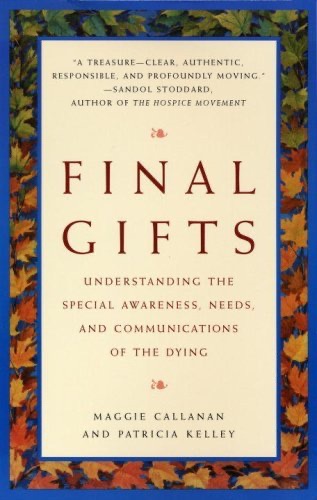“Final Gifts” by Maggie Callanan and Patricia Kelley explores the profound experiences of dying patients and the invaluable insights they offer to caregivers. The book delves into the dying process, communication with the terminally ill, and the significance of symbolic messages and signs. Through heartfelt anecdotes and practical guidance, the authors illuminate the importance of compassionate care, spiritual support, and meaningful connection in end-of-life experiences. “Final Gifts” serves as a compassionate and insightful resource for caregivers, offering wisdom and comfort to those navigating the challenges of supporting dying patients and their families.
Here’s a detailed 10-point summary:
- Understanding the Dying Process:
- The book delves into the physical, emotional, and spiritual aspects of the dying process, offering insights into the experiences of terminally ill individuals.
- Callanan and Kelley explore common symptoms, fears, and challenges faced by dying patients and their loved ones.
- The Concept of “Final Gifts”:
- “Final gifts” refer to the profound moments of clarity, communication, and connection experienced by dying patients in the final stages of life.
- The authors discuss how these gifts often take the form of symbolic messages, expressions of love, or moments of reconciliation with loved ones.
- Communicating with the Dying:
- The book provides guidance for caregivers on how to communicate effectively with dying patients, even when verbal communication may be limited.
- Callanan and Kelley offer strategies for listening, interpreting nonverbal cues, and providing comfort and reassurance to the dying.
- Recognizing Signs and Symbols:
- Readers learn to recognize and interpret signs and symbols that may indicate a patient’s readiness for death or desire to communicate.
- The authors discuss common themes such as dreams, visions, and messages from deceased loved ones.
- Honoring Spiritual Needs:
- “Final Gifts” explores the spiritual dimensions of the dying process and the importance of addressing patients’ spiritual needs and beliefs.
- Callanan and Kelley discuss how caregivers can provide comfort and support by honoring patients’ religious or spiritual practices.
- Supporting Families and Caregivers:
- The book offers guidance for supporting families and caregivers through the challenges of caring for a dying loved one.
- Callanan and Kelley provide insights into coping strategies, self-care practices, and ways to navigate grief and loss.
- Creating a Peaceful Environment:
- Readers learn the importance of creating a peaceful and comforting environment for dying patients, both in the home and in healthcare settings.
- The authors offer practical tips for creating a calming atmosphere and enhancing patients’ comfort and dignity.
- Navigating End-of-Life Decisions:
- “Final Gifts” addresses the complexities of end-of-life decision-making and the importance of honoring patients’ wishes and preferences.
- Callanan and Kelley discuss advance care planning, palliative care options, and the role of hospice in providing compassionate end-of-life care.
- Finding Meaning and Purpose:
- The book explores how patients and families can find meaning and purpose in the dying process, even amidst pain and suffering.
- Callanan and Kelley share stories of resilience, acceptance, and spiritual growth experienced by individuals facing the end of life.
- Embracing Life’s Final Chapter:
- In the final chapters, “Final Gifts” encourages readers to embrace life’s final chapter with grace, compassion, and gratitude.
- The authors offer reflections on the profound gifts and lessons that can be found in the dying process, and the transformative impact of love and connection in the face of mortality.

In summary, “Final Gifts” is a compassionate and insightful exploration of the dying process and the profound moments of connection and communication that occur at life’s end. Through practical guidance, heartfelt stories, and spiritual wisdom, Callanan and Kelley empower caregivers to provide comfort, support, and dignity to dying patients and their families.



